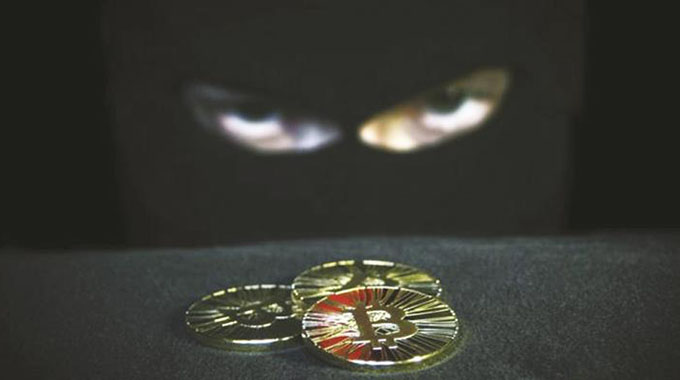Bitcoin, a criminal’s best friend?

Leroy Dzenga Features Writer
Bitcoin, a blockchain cryptocurrency which has been touted as a solution to the world’s hard cash headaches, has failed to penetrate the world with the speed usually expected of digital products.
The scepticism exhibited by some has deprived the digital trade tool of the wide acceptability critical for any currency to be functional.
Criminals have also exploited the encryption element of the bitcoin to launch a string of attacks on vulnerable internet users.
Online blackmail cases have been on the rise, especially to Yahoo users whose information was obtained by hackers during an attack in the first quarter of 2018.
Many have been receiving emails in which they are threatened with exposure of their online activity to friends and family unless they pay ransom in bitcoin.
Locals have not been spared of such messages which experts say are usually a result of what is commonly known as social engineering.
ICT guru and Digital Society of Zimbabwe coordinator Chris Musodza warned of how information can be discreetly siphoned from online par- ticipants.
“There is a trend called social engineering; they do not break into people’s accounts, this is when hackers use deception into divulging confidential information which can be used for fraudulent purposes,” Musodza said.
Hackers these days prey on human weaknesses to penetrate their guard.
“They know that people are afraid, they know that people are greedy,” said Musodza. “This is why people see emails which suggest that they have won a prize, or people who pretend to be orphans from rich families claiming to have money somewhere.
“All these are scams, there is no way one can work from home and earn $5 000 from an internet advert.”
Entertaining such mail can be dangerous as the level of such security breaches can never be underestimated in online interactions.
“The best way people can deal with such threats is to ignore and flag them with email service providers,” said Musodza. “It is also important to block such accounts so that they are unable to contact your account.”
A few key steps to remember when browsing include clearing history religiously.
Musodza sai: “When people are on the internet, they should always clear their cache, use incognito mode when using Google Chrome or similar functions on other browsers.”
According to the Centre for Internet Security there are ways to identify a hoax.
“There are a couple of key indicators that can help you in determining if the email is a hoax or not. For instance, many hoaxes are opportunistically emailed to multiple recipients,” the CIS said.
Hoax messages are usually vague, unless the attackers are making a nuanced target on an individual.
“Identifying the threat, actors use of generic language and lack of specific details about the target are good indicators that it’s a hoax,” the CIS said.
When people are unsettled they make rash decisions and criminals pounce on such impulses.
According to the CIS: “Another key component of these scams is that the threat actor incites a sense of urgency by demanding immediate payment to avoid malicious activity, which makes it harder for the recipient to calm down and think it through.
“The best way to tentatively check the authenticity of an email is to conduct searches on keywords, the cryptocurrency wallet ID, and sender’s email address, as this may yield multiple examples of others affected by the same hoax.”
Despite the emerging security issues, it appears bitcoin is still a solution to ease up international transactions.
Even with some of the problem related to them, blockchain enthusiast William Chui said cryptocurrencies have a role to play in Zimbabwe’s economic future.
“Bitcoin solves a critical problem of sending money across borders, as banks have poorly funded nostro accounts,” he said. “It has a real use case in Zimbabwe, as it allows businesses and individuals to seamlessly send and receive money across borders in less than 10 minutes.”
The Reserve Bank of Zimbabwe has since directed financial institutions to exit any existing relationships with virtual currency exchanges, including bitcoin, and proceed to liquidate and restitute existing account balances.
RBZ Governor Dr John Mangudya also warned the public against trading in cryptocurrencies.
“Any person who buys, sells, or otherwise transacts in cryptocurrencies, whether online, or otherwise, does so at their own risk and will have no recourse to the Reserve Bank or to any regulatory authority in the country,” he said in a statement.
Asked on its potential, Chui said bitcoin has been gaining ground steadily although the accurate numbers are not available at hand.
“As this is a distributed ledger and does not contain details of the users’ location, any figure used will just be speculation,” he said. “However, Golix, prior to the ban by the Reserve Bank of Zimbabwe in May 2018 had over 50 000 registered customers who used their platform.”
According to one of Grant Thornton’s International Business Report (IBR) in 2017, almost 46 percent of businesses facing cyber extortion have been asked to pay using Bitcoin.
This shows the extent of crime being committed behind the new monetary idea, enthusiasts have been hoping that the market confidence on bitcoin does not wane in the wake of criminal use by hackers and unscrupulous characters.
Feedback: [email protected]







Comments